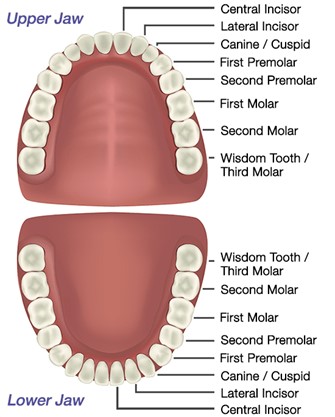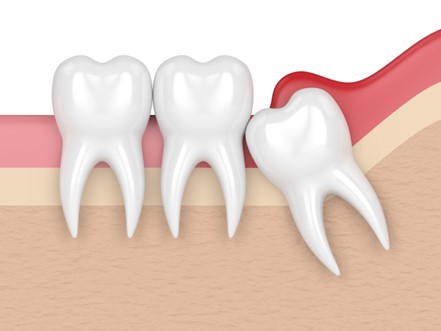Wisdom Teeth

Have you ever wondered why we have wisdom teeth? Or when or if we should remove them? Perhaps you’ve even wondered what exactly are wisdom teeth? As a practice that treats the whole family, Spokane Dental sees a lot of our patients through wisdom teeth extraction, and we are here to answer all your questions about them.
What Are Wisdom Teeth?
Wisdom teeth, also known as third molars, are the last set of molars to erupt in the back of the mouth on both the upper (maxilla) and lower (mandible) jaw. They typically begin to erupt in the late teens or early twenties, and they can cause a range of dental issues if they are not removed at the appropriate time. Many factors determine whether or not a patient needs to have their wisdom teeth removed, all of which are explored by Dr. Smith in a clinical exam with imaging.
It is important to note that not everyone needs to have their wisdom teeth removed. In fact, some people's wisdom teeth never cause any problems and don't need to be removed at all. Generally, these are the patients that have room in their mouths for the wisdom teeth to erupt without causing problems for the surrounding teeth. However, for many people, wisdom teeth can cause a range of dental problems, including overcrowding, infection, and impaction. Here are the largest factors that determine whether or not a patient may need a third molar extraction:
Over Crowding

Overcrowding occurs when there is not enough space in your mouth for your wisdom teeth to erupt properly. This can cause your teeth to shift, leading to misalignment and bite problems. Overcrowding can also make it difficult to clean your teeth properly, which can lead to tooth decay and gum disease.
Impaction and Infection
Infection is another common problem associated with wisdom teeth becoming impacted. When wisdom teeth start to erupt, they can push against the surrounding teeth and gums, creating pockets where bacteria can collect and cause infection. This can lead to swelling, pain, and even abscesses.
Impaction occurs when wisdom teeth do not fully emerge from the gums. This can cause pain, swelling, and infection. Impacted wisdom teeth can also damage the surrounding teeth and gums, leading to decay, periodontal disease, and even bone loss.
When Wisdom Teeth Should Be Removed
So, when should wisdom teeth be removed? The answer depends on a few factors, including the position of the wisdom teeth, the age of the patient, and any symptoms the patient may be experiencing.
In general, it is best to remove wisdom teeth before they cause any problems. This typically means removing them in your late teens or early twenties before the roots have fully developed and the teeth have become too firmly embedded in the jawbone. If the wisdom teeth are already causing problems, such as overcrowding or infection, they may need to be removed as soon as possible. In some cases, we may recommend removing the wisdom teeth even if they are not causing any immediate problems, simply as a preventive measure to avoid future problems.
The position of the wisdom teeth is also an important factor in determining when they should be removed. If the wisdom teeth are fully erupted and positioned correctly, they may not need to be removed at all. However, if they are partially or fully impacted, they will almost certainly need to be removed to avoid further problems. Our in-office Cone Beam Imaging actually produces a 3-D image of the jaw and teeth, so we are able to get the full scope of each patient’s anatomy and whether there are any further underlying problems and make a full treatment plan.
Finally, any symptoms the patient is experiencing are always taken into account when deciding whether to remove wisdom teeth. If the patient is experiencing pain, swelling, or infection, it is likely that the wisdom teeth will need to be removed. Other symptoms that may indicate the need for wisdom tooth removal include difficulty opening the mouth, difficulty chewing, and bad breath (which can be a sign of infection).
In summary, wisdom teeth should be removed when they are causing problems such as overcrowding, infection, or impaction. It is generally best to remove wisdom teeth before they cause problems, in your late teens or early twenties. However, if you are experiencing symptoms such as pain, swelling, or infection, it may be necessary to remove them sooner. We will make a custom treatment plan that is right for you, and depending on the case we can remove wisdom teeth in the comfort of the Spokane Dental office, or in some instances refer to an oral surgeon. Give us a call today at (509)822-5614 to schedule an appointment.
Photo credit:
https://www.rmperiohealth.com/blog/wp-content/uploads/2020/07/rsz_adobestock_203872422.jpg
https://www.vcdental.com.au/wp-content/uploads/2020/01/Tooth-Types_Adult_Web.png

